对外经济贸易大学:《高级商务英语听说》课程教学资源(课件讲稿)Unit 14 Cultural Differences—Manners and Taboos 文化差异—禁忌礼仪
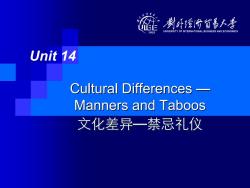
制舒价買易大訾 1951 UNIVERSITY OF INTERNATIONAL BUSINESS AND ECONOMICS Unit 14 Cultural Differences Manners and Taboos 文化差异一禁忌礼仪
Cultural Differences — Manners and Taboos 文化差异 —禁忌礼仪 Cultural Differences Cultural Differences — Manners and Taboos Manners and Taboos 文化差异 —禁忌礼仪 Unit 14
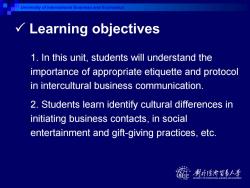
University of International Business and Economics √Learning objectives 1.In this unit,students will understand the importance of appropriate etiquette and protocol in intercultural business communication. 2.Students learn identify cultural differences in initiating business contacts,in social entertainment and gift-giving practices,etc. 制仟香价贸易大孝 UNIVERSITY OF INTERNATIONAL BUSINESS AND ECONOMCS
University of International Business and Economics 3 Learning objectives 1. In this unit, students will understand the importance of appropriate etiquette and protocol in intercultural business communication. 2. Students learn identify cultural differences in initiating business contacts, in social entertainment and gift-giving practices, etc
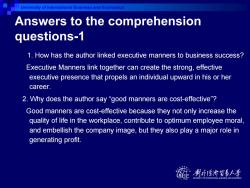
University of International Business and Economics Answers to the comprehension questions-1 1.How has the author linked executive manners to business success? Executive Manners link together can create the strong,effective executive presence that propels an individual upward in his or her career. 2.Why does the author say "good manners are cost-effective"? Good manners are cost-effective because they not only increase the quality of life in the workplace,contribute to optimum employee moral, and embellish the company image,but they also play a major role in generating profit. 尉卧价黄易大岁 15
University of International Business and Economics Answers to the comprehension questions-1 1. How has the author linked executive manners to business success? Executive Manners link together can create the strong, effective executive presence that propels an individual upward in his or her career. 2. Why does the author say “good manners are cost-effective”? Good manners are cost-effective because they not only increase the quality of life in the workplace, contribute to optimum employee moral, and embellish the company image, but they also play a major role in generating profit
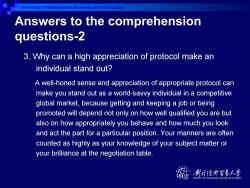
University of International Business and Economics Answers to the comprehension questions-2 3.Why can a high appreciation of protocol make an individual stand out? A well-honed sense and appreciation of appropriate protocol can make you stand out as a world-savvy individual in a competitive global market,because getting and keeping a job or being promoted will depend not only on how well qualified you are but also on how appropriately you behave and how much you look and act the part for a particular position.Your manners are often counted as highly as your knowledge of your subject matter or your brilliance at the negotiation table. 制卧价贫易大学 15 UNIVTRSIT¥¥T月。4L地hE等SAND FCONOMC
University of International Business and Economics Answers to the comprehension questions-2 3. Why can a high appreciation of protocol make an individual stand out? A well-honed sense and appreciation of appropriate protocol can make you stand out as a world-savvy individual in a competitive global market, because getting and keeping a job or being promoted will depend not only on how well qualified you are but also on how appropriately you behave and how much you look and act the part for a particular position. Your manners are often counted as highly as your knowledge of your subject matter or your brilliance at the negotiation table
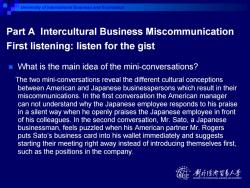
University of International Business and Economics Part A Intercultural Business Miscommunication First listening:listen for the gist What is the main idea of the mini-conversations? The two mini-conversations reveal the different cultural conceptions between American and Japanese businesspersons which result in their miscommunications.In the first conversation the American manager can not understand why the Japanese employee responds to his praise in a silent way when he openly praises the Japanese employee in front of his colleagues.In the second conversation,Mr.Sato,a Japanese businessman,feels puzzled when his American partner Mr.Rogers puts Sato's business card into his wallet immediately and suggests starting their meeting right away instead of introducing themselves first, such as the positions in the company. 制卧爱价贫易大孝 15 UNIVTRSIT¥¥T月。4L地hE等SAND FCONOMC
University of International Business and Economics Part A Intercultural Business Miscommunication First listening: listen for the gist What is the main idea of the mini-conversations? The two mini-conversations reveal the different cultural conceptions between American and Japanese businesspersons which result in their miscommunications. In the first conversation the American manager can not understand why the Japanese employee responds to his praise in a silent way when he openly praises the Japanese employee in front of his colleagues. In the second conversation, Mr. Sato, a Japanese businessman, feels puzzled when his American partner Mr. Rogers puts Sato’s business card into his wallet immediately and suggests starting their meeting right away instead of introducing themselves first, such as the positions in the company
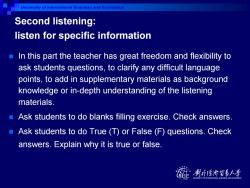
University of International Business and Economics Second listening: listen for specific information In this part the teacher has great freedom and flexibility to ask students questions,to clarify any difficult language points,to add in supplementary materials as background knowledge or in-depth understanding of the listening materials. Ask students to do blanks filling exercise.Check answers. Ask students to do True (T)or False (F)questions.Check answers.Explain why it is true or false. 制计爱价贸易大考 UNIVTRSIT¥¥T月。4L地hE等SAND FCONOMC
University of International Business and Economics Second listening: listen for specific information In this part the teacher has great freedom and flexibility to ask students questions, to clarify any difficult language points, to add in supplementary materials as background knowledge or in-depth understanding of the listening materials. Ask students to do blanks filling exercise. Check answers. Ask students to do True (T) or False (F) questions. Check answers. Explain why it is true or false

University of International Business and Economics Third listening:sentences imitation Ask students to use the following active vocabularies to form sentences as what they have heard from listening (Dictate then remember). 1.fumble I fumbled around in my bag for a cigarette. 2.graciously She graciously accepted his gift and opened it very carefully. 3.flip side Sato is puzzled when he turns the card over to its flip side and it is bland. 4.inadequate The parking facilities are inadequate for a busy shopping centre. 5.incompetent The Prime Minister is incompetent to govern the country. 制计爱价贸易大考 UNIVERSITY OF INTERNATIONAL BUSINESS AND ECONOMCS
University of International Business and Economics Third listening: sentences imitation Ask students to use the following active vocabularies to form sentences as what they have heard from listening (Dictate then remember). 1. fumble I fumbled around in my bag for a cigarette. 2. graciously She graciously accepted his gift and opened it very carefully. 3. flip side Sato is puzzled when he turns the card over to its flip side and it is bland. 4. inadequate The parking facilities are inadequate for a busy shopping centre. 5. incompetent The Prime Minister is incompetent to govern the country
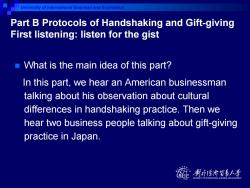
University of International Business and Economics Part B Protocols of Handshaking and Gift-giving First listening:listen for the gist What is the main idea of this part? In this part,we hear an American businessman talking about his observation about cultural differences in handshaking practice.Then we hear two business people talking about gift-giving practice in Japan. 制仟香价贸易大孝 15 wER与T节¥Tt。4L地S AND FCONOMC
University of International Business and Economics Part B Protocols of Handshaking and Gift-giving First listening: listen for the gist What is the main idea of this part? In this part, we hear an American businessman talking about his observation about cultural differences in handshaking practice. Then we hear two business people talking about gift-giving practice in Japan
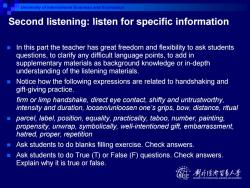
University of International Business and Economics Second listening:listen for specific information In this part the teacher has great freedom and flexibility to ask students questions,to clarify any difficult language points,to add in supplementary materials as background knowledge or in-depth understanding of the listening materials. Notice how the following expressions are related to handshaking and gift-giving practice. firm or limp handshake,direct eye contact,shifty and untrustworthy, intensity and duration,loosen/unloosen one's grips,bow,distance,ritual parcel,label,position,equality,practicality,taboo,number,painting, propensity,unwrap,symbolically,well-intentioned gift,embarrassment, hatred,proper,repetition Ask students to do blanks filling exercise.Check answers. Ask students to do True (T)or False (F)questions.Check answers. Explain why it is true or false. 制卧价贫易大学 15 wER与T节¥Tt。4L地S AND FCONOMC
University of International Business and Economics Second listening: listen for specific information In this part the teacher has great freedom and flexibility to ask students questions, to clarify any difficult language points, to add in supplementary materials as background knowledge or in-depth understanding of the listening materials. Notice how the following expressions are related to handshaking and gift-giving practice. firm or limp handshake, direct eye contact, shifty and untrustworthy, intensity and duration, loosen/unloosen one’s grips, bow, distance, ritual parcel, label, position, equality, practicality, taboo, number, painting, propensity, unwrap, symbolically, well-intentioned gift, embarrassment, hatred, proper, repetition Ask students to do blanks filling exercise. Check answers. Ask students to do True (T) or False (F) questions. Check answers. Explain why it is true or false

University of International Business and Economics Third listening:sentence imitation Ask students to use the following adjectives to form sentences as what they have heard from listening (Dictate then remember) 1.limp His body suddenly went limp and he fell down on the floor. 2.intimidating威胁的Cawley received an intimidating letter from her ex-husband's lawyer. 3.hooded The glitter in his hooded eyes made it impossible for her to hazard even the wildest guess at what he was thinking. 4.languid He greeted Charles with a languid wave of his hand. 5.exuberant The prose is exuberant and knowingly exotic. 6.irresistible High interest rates have made these saving plans irresistible to small investors. 制卧爱价贫易大学 UNIVERSITY OF INTERNATIONAL BUSINESS AND ECONOMCS
University of International Business and Economics Third listening: sentence imitation Ask students to use the following adjectives to form sentences as what they have heard from listening (Dictate then remember). 1. limp His body suddenly went limp and he fell down on the floor. 2. intimidating 威胁的 Cawley received an intimidating letter from her ex-husband's lawyer. 3. hooded The glitter in his hooded eyes made it impossible for her to hazard even the wildest guess at what he was thinking. 4. languid He greeted Charles with a languid wave of his hand. 5. exuberant The prose is exuberant and knowingly exotic. 6. irresistible High interest rates have made these saving plans irresistible to small investors
按次数下载不扣除下载券;
注册用户24小时内重复下载只扣除一次;
顺序:VIP每日次数-->可用次数-->下载券;
- 对外经济贸易大学:《高级商务英语听说》课程教学资源(课件讲稿)Unit 13 Effective Communication—Language and Culture 有效沟通—语言文化.pdf
- 对外经济贸易大学:《高级商务英语听说》课程教学资源(课件讲稿)Unit 12 On the Business Legal Front 站在商业法律前沿.pdf
- 对外经济贸易大学:《高级商务英语听说》课程教学资源(课件讲稿)Unit 11 Making Investment Rationally 理性投资.pdf
- 对外经济贸易大学:《高级商务英语听说》课程教学资源(课件讲稿)Unit 9 Recruitment & Performance Appraisal 招聘和业绩评估.pdf
- 对外经济贸易大学:《高级商务英语听说》课程教学资源(课件讲稿)Unit 10 Financial World 金融世界.pdf
- 对外经济贸易大学:《高级商务英语听说》课程教学资源(课件讲稿)Unit 8 Motivating Employees 员工激励.pdf
- 对外经济贸易大学:《高级商务英语听说》课程教学资源(课件讲稿)Unit 7 Management Gurus 管理大师.pdf
- 对外经济贸易大学:《高级商务英语听说》课程教学资源(课件讲稿)Unit 6 Advertising Appeals—Image & Personality 广告诉求—形象和性格.pdf
- 对外经济贸易大学:《高级商务英语听说》课程教学资源(课件讲稿)Unit 4 Consumer Behavior 消费者行为.pdf
- 对外经济贸易大学:《高级商务英语听说》课程教学资源(课件讲稿)Unit 3 Making Economic Sense 解读经济.pdf
- 对外经济贸易大学:《高级商务英语听说》课程教学资源(课件讲稿)Unit 2 Hot Issues in International Trade 国际贸易的热点问题.pdf
- 对外经济贸易大学:《高级商务英语听说》课程教学资源(课件讲稿)Unit 1 Globalization Trend 全球化趋势.pdf
- 对外经济贸易大学:《高级商务英语听说》课程教学资源(授课教案)Unit 18 New Economy and E-commerce 新经济与电子商务.pdf
- 对外经济贸易大学:《高级商务英语听说》课程教学资源(授课教案)Unit 17 Get Yourself Wired—Internet and Mobile Phones 连线时代—互联网与移动电话.pdf
- 对外经济贸易大学:《高级商务英语听说》课程教学资源(授课教案)Unit 16 A Socially Responsible Corporation—Business Ethics 企业社会责任—商业伦理.pdf
- 对外经济贸易大学:《高级商务英语听说》课程教学资源(授课教案)Unit 15 Organizational Culture—Competitive Advantage 企业文化—竞争优势.pdf
- 对外经济贸易大学:《高级商务英语听说》课程教学资源(授课教案)Unit 14 Cultural Differences—Manners and Taboos 文化差异—禁忌礼仪.pdf
- 对外经济贸易大学:《高级商务英语听说》课程教学资源(授课教案)Unit 13 Effective Communication—Language and Culture 有效沟通—语言文化.pdf
- 对外经济贸易大学:《高级商务英语听说》课程教学资源(授课教案)Unit 12 On the Business Legal Front 站在商业法律前沿.pdf
- 对外经济贸易大学:《高级商务英语听说》课程教学资源(授课教案)Unit 11 Making Investment Rationally 理性投资.pdf
- 对外经济贸易大学:《高级商务英语听说》课程教学资源(课件讲稿)Unit 15 Organizational Culture—Competitive Advantage 企业文化—竞争优势.pdf
- 对外经济贸易大学:《高级商务英语听说》课程教学资源(课件讲稿)Unit 16 A Socially Responsible Corporation—Business Ethics 企业社会责任—商业伦理.pdf
- 对外经济贸易大学:《高级商务英语听说》课程教学资源(课件讲稿)Unit 17 Get Yourself Wired—Internet and Mobile Phones 连线时代—互联网与移动电话.pdf
- 对外经济贸易大学:《高级商务英语听说》课程教学资源(课件讲稿)Unit 18 New Economy and E-commerce 新经济与电子商务.pdf
- 对外经济贸易大学:《商务英语》课程教学资源(教学大纲).pdf
- 对外经济贸易大学:《商务英语》课程教学资源(试卷习题)期末考试试卷(一).pdf
- 对外经济贸易大学:《商务英语》课程教学资源(试卷习题)期末考试试卷(一)答案.pdf
- 对外经济贸易大学:《商务英语》课程教学资源(试卷习题)期末考试试卷(二).pdf
- 对外经济贸易大学:《商务英语》课程教学资源(试卷习题)期末考试试卷(二)答案.pdf
- 对外经济贸易大学:《商务英语》课程教学资源(课后练习,共三十六章).pdf
- 对外经济贸易大学:《商务英语》课程教学资源(学习指南).pdf
- 对外经济贸易大学:《商务英语》课程教学资源(授课教案)Chapter 1 What Is Economics.pdf
- 对外经济贸易大学:《商务英语》课程教学资源(授课教案)Chapter 2 Needs and Wants.pdf
- 对外经济贸易大学:《商务英语》课程教学资源(授课教案)Chapter 3 Supply and Demand.pdf
- 对外经济贸易大学:《商务英语》课程教学资源(授课教案)Chapter 4 Consumer Market In China.pdf
- 对外经济贸易大学:《商务英语》课程教学资源(授课教案)Chapter 6 Brief History of Business.pdf
- 对外经济贸易大学:《商务英语》课程教学资源(授课教案)Chapter 7 Business Environment.pdf
- 对外经济贸易大学:《商务英语》课程教学资源(授课教案)Chapter 8 What is Production.pdf
- 对外经济贸易大学:《商务英语》课程教学资源(授课教案)Chapter 9 Factors of Production.pdf
- 对外经济贸易大学:《商务英语》课程教学资源(授课教案)Chapter 10 Product Life Cycle.pdf
